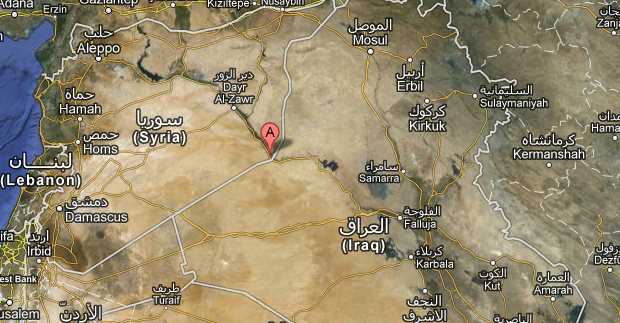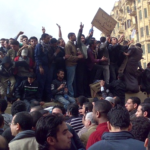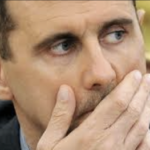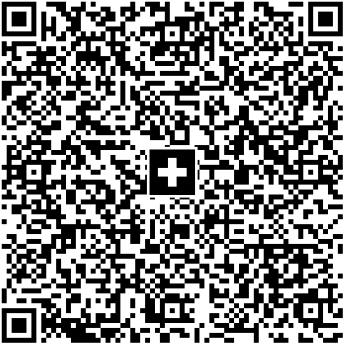Syrien: Hilfe Iraks für Baschar al-Assad behindert
Red. Die meisten Güter bezieht das boykottierte Syrien aus dem Irak vom Regime Nouri al-Mailiki, das die USA jahrelang mit Milliarden unterstützt haben. Maliki steht dem schiitischen Iran und der alawitischen Diktatur in Syrien näher als der mehrheitlich sunnitischen Opposition in diesen Ländern.
Grosse Einfuhrstrasse abgeschnitten
Jetzt haben die Aufständischen in Syrien die Grenzstadt Abu Kamal, die etwa 55’000 Einwohner zählt, und deren Flughafen unter Kontrolle und können deshalb die Haupteinfuhrstrasse aus Irak blockieren. Doch der Luftkorridor von Iraq nach Syrien wird dadurch nicht blockiert. Am 1. Dezember berichtete die New York Times, dass dieser Luftkorridor heute der «grösste Nachschubweg für Waffen, einschliesslich Raketen sei. Nach Ansicht von Asaad al-Saleh, Professor an der Universität von Utah in den USA, könnte die Lage für die Aufständischen in Syrien nur stabilisiert werden, wenn eine Flugverbotszone eingerichtet würde.
—
BEITRAG VON PROF. ASAAD AL-SALEH
The Struggle for Abu Kamal: Peace after Defeating the Dictator’s Forces
Located on the bank of the Euphrates near the borders with Iraq, Abu Kamal, the city and its towns, has been an active participant in the revolution. The first significant demonstration was as early as 22 April 2011. This YouTube video shows people chanting with slogans intended as an affront to the regime. Shoes are thrown on a concrete portrait of Hafez al-Assad, as demonstrators gather in the center of the city. In the early stage of the uprising, repeated news of the demonstrations in Abu Kamal and other Syrian cities began to embarrass the regime’s media, particularly when Aljazeera and Alarabiya began to cover the protest in this traditionally neglected area. At that point, the government pretended that there was only a «crisis», rather than a full-blown revolution, and people were not protesting against al-Assad’s rule. Abu Kamal, just like other restive areas, was slightly covered by the Syrian news agency, SANA.
Eventually, the army was sent to the city to quell the increasing protest. After initially cheering for the soldiers, hoping that the soldiers would either restrain from targeting civilians or, even better, defect, the residents of Abu Kamal gradually showed resistance to the presence of the army in their area. The last army stationed in Abu Kamal was the colonial French force. Yet, this foreign force was kicked out of Abu Kamal after a feud with the Uqaidat tribe that caused the death of French soldiers and, in retaliation, the chief of the tribe.
When both the rebels and the regime’s forces were fighting inside the city, the latter were overwhelmed by fighters who knew how to maneuver inside the area. The rebels destroyed many of the army’s vehicles and forced the soldiers to take shelter outside but still close to the city. For more than ten months, the regime was continuously shooting at commercial and residential areas, forcing almost all residents to leave the city and move either to the towns or to cross the borders to Iraq as refugees.
The regime’s last resort (to achieve almost nothing beyond destruction) was to use its air force to shell the city and some of the towns. One of the towns that were targeted by the military jets was al-Jalaa, the birthplace of the defected Syrian ambassador to Iraq and one of the Ugaidat’s leading figures, Nawaf al-Fares. Raids were launched almost daily from September 2012, mounting to 70 raids by 14 November, according to the official Facebook page representing the Local Coordination in Abu Kamal. The regime used heavy artillery against civilians and more than 1,000 mortars landed in the city. The bases for these attacks were the security headquarters and the only airport in the city, Hamdan airport. The rebels attempted to take over the heavily secured airport in early September of 2011, but were unsuccessful and some of them fell in the assault. Since then, they were preparing themselves to capture the airport and to terminate this center of regime’s power and destruction.
On 8 November 2012, the regime’s security headquarters, called the «security square» by the rebels, became under siege. This fortified area included the public hospital, where snipers were located, the military recruiting center, and the military intelligence building. Two days later, air raids showered the city to prevent the besieging rebels from taking over these bases. These raids left 16 people dead, five of them were women. On Thursday 15 November 2012, the rebels finally liberated the security square and downed a helicopter; but lost three fighters in the operation. The next and last important target was the Hamdan airport, which fell in their hands on Saturday 17 November. The regime’s soldiers and officers in the airport fled into the dessert, leaving behind them the last base of the regime in Abu Kamal. Freeing the airport was the bloodiest encounter for rebels, who lost 15 men. The casualties were from Abu Kamal and the towns’ participants, and one of the fallen heroes was from the town of al-Salhiya and is a relative to the author. Since then, peace returned to Abu Kamal and the regime did not (maybe could not) attack it again.
The advantages of liberating the airport and removing the regime’s forces from Abu Kamal are many but here are the most important ones. Since the fall of the airport, Abu Kamal did not witness any more air strikes, a situation that saved many lives and will allow more fighters to regroup and move to the other few areas under the control of the regime in Dayr al-Zour. Many of Abu Kamal’s fighters have appeared on videos addressing al-Assad by this warning: «Do not leave, we will come to you in Damascus.» This might be a serious threat if rebels across the country free their areas and start moving to the capital. Additionally, according to Professor Juan Cole in his blog Informed Comment, there is an economic factor that should be noted when considering the liberation of Abu Kamal:
»70% of the goods coming into Syria were coming from the Iraq of PM Nouri al-Maliki, who had refused to join a blockade of Syria because of his new alliance with Iran. But al-Maliki’s attitude is irrelevant if the revolutionaries have Abu Kamal. This development is a nightmare for the Shiite-dominated government of Iraq, since it is fighting a low-intensity struggle with its Sunnis, who predominant in the areas abutting Syria. If Sunni fundamentalists in the FSA hook up with their Iraqi counterparts, that is trouble for al-Maliki and Iran. And, Iraqi Sunnis can now more freely export arms and goods to their Syrian co-religionists.”(Juan Cole).
Even though «70% of the goods» may be too good to be true—as the eastern Syrian region and its borders with Iraq have been out of government’s control since last year—any future trade with Iraq before the fall of al-Assad would be hard to imagine when this area is controlled by the revolutionaries. Professor Cole’s allusion to the Shia/Sunni binary can be seen within the context of Westerners magnifying these sectarian divisions when, at least in the completely Sunni Abu Kamal, people still emphasize that the fight is against al-Assad not his sect. More to the point, there were no reliable reports that Sunni Iraqi fighters assisted the FSA fighters in Abu Kamal.
The peace that Abu Kamal enjoys now is due to the operations that liberated it from the regime’s military and security presence, particularly after its airport was neutralized. If there is one lesson to be learned from liberating Abu Kamal, it is that a no-fly zone is urgently needed. Such a no-fly zone will save many lives and this will mean that the regime cannot kill more civilians and that the FSA, from all over Syrian cities and towns, will continue to remove al-Assad from Damascus.
Themenbezogene Interessenbindung der Autorin/des Autors
Keine. Asaad al-Saleh ist stellv. Professor am Middle East Center der Univerity von Utah in Salt Lake City.










